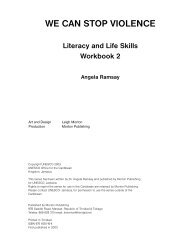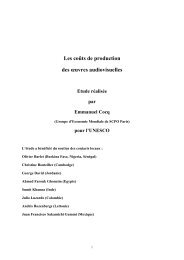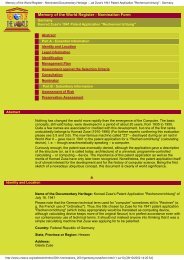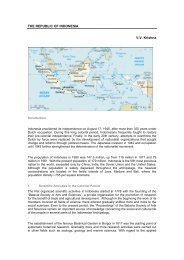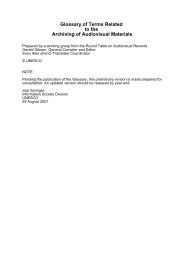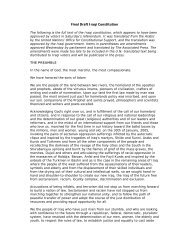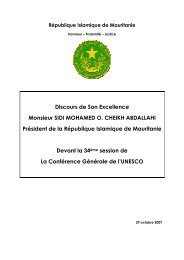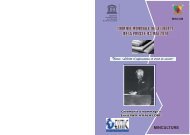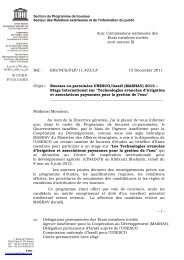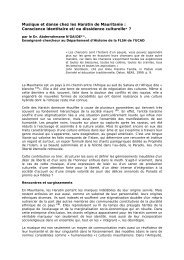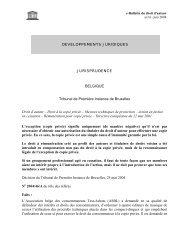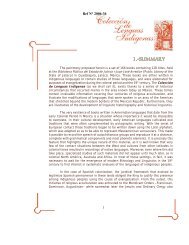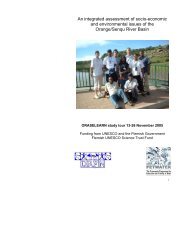Accepted Papers - 3.pdf - UNESCO
Accepted Papers - 3.pdf - UNESCO
Accepted Papers - 3.pdf - UNESCO
You also want an ePaper? Increase the reach of your titles
YUMPU automatically turns print PDFs into web optimized ePapers that Google loves.
National Seminar on Rainwater Harvesting and Water Management 11-12 Nov. 2006, Nagpur<br />
76. The Public Awareness on Rainwater Harvesting<br />
Voltaire has said, ‘necessity is the mother<br />
of invention’. In the face of fast depleting water<br />
resources re-inventing conservation techniques is<br />
no longer only a likely option but an essential<br />
imperative. Of all the options available for renewing<br />
water resources, rain water harvesting (RWH) is<br />
clearly the most ancient and viable option for India<br />
both in terms of implementation and cost-benefit<br />
analysis. The government, both at the centre and<br />
the state levels, has introduced policies to promote<br />
and even enforce RWH but unless the public is aware<br />
and consciously recognizes the need for RWH,<br />
implementation will pose problems. This paper<br />
explores various measures for creating public<br />
awareness about RWH both at the micro and the<br />
macro level in an attempt to inspire and motivate<br />
various urban citizen groups to undertake the same.<br />
This paper will restrict itself to the need as well as<br />
the benefits and viability of RWH in urban areas<br />
and the role that educational institutions and other<br />
organizations can play in spreading the awareness.<br />
Fr. Agnel Technical Education Complex will<br />
serve as a case study for RWH on the micro level.The<br />
Vashi unit of Agnel Seva Ashram(ASA)which is the<br />
social wing of this organization has already geared<br />
itself up to promote the concept of water<br />
conservation. Its impressive week-long programme,<br />
‘Save Electricity and Water Abhiyan’ (SEWA), which<br />
was launched as a multi-pronged attempt to impress<br />
upon our students the need to use these scarce<br />
resources judiciously, is fast gathering momentum.<br />
A seminar on Rain Water Harvesting and a pilot<br />
RWH project for the staff quarters of the complex<br />
are next on the anvil. The long term goal is to extend<br />
RWH to meet the water requirements of the entire<br />
complex and subsequently to other Fr. Agnel<br />
Complexes in the country. Through net-working<br />
*Bertha Fernandes **Sandip H. Deshmukh<br />
with other organizations(private and government<br />
as well as NGOs) each Fr. Agnel Complex could<br />
serve as a model and a centre of informative<br />
action for other institutions and organizations<br />
in their respective zones. As the old saying goes,<br />
example is always far more effective than precept.<br />
“Unutilized or underutilized plant capacity is<br />
the costliest form of waste in developing countries.<br />
Under developed countries are always under<br />
managed countries”, said a management guru. I<br />
think this statement very apt in the context of water<br />
because under utilized or unutilized water capacity<br />
is the costliest form of waste in any country. Most<br />
of the developed world has taken cognizance of this<br />
and has already got its water management systems<br />
in place but developing countries like ours have a<br />
long way to go in harnessing this waste. Despite<br />
being in a monsoon region, availability of water is<br />
already a serious problem in most Indian states<br />
irrespective of their physical terrain and other<br />
geographical features. Infact, Cherapunji which<br />
receives the highest rainfall in the country (1100mm<br />
annually) has serious drinking water shortages. This<br />
is a clear indication of mismanagement of natural<br />
water resources and this mismanagement is evident<br />
through the length and breadth of the country barring<br />
a few geographical pockets where communities have<br />
worked to put their resources to good use. We have<br />
heard of the recent farmer suicides in Vidharba<br />
because of drought related debt burdens. The<br />
Government finally took note of the situation and<br />
offered monetary assistance. But is this the real<br />
solution to the problem? “Give a man a fish and<br />
you give him a meal , Teach him to fish and you<br />
give him a living” , goes the familiar axiom. The<br />
need for and the techniques of rainwater harvesting<br />
are the ‘lessons’ that will give our farmers a living.<br />
*Sr.Lecturer ** Asst.Professor<br />
Fr.Agnel Technical Education Complex, Sector 9A, Vashi, Navi Mumbai 400703<br />
E-mail: berthaf@gmail.com, sandiphk@rediffmail.com<br />
424



